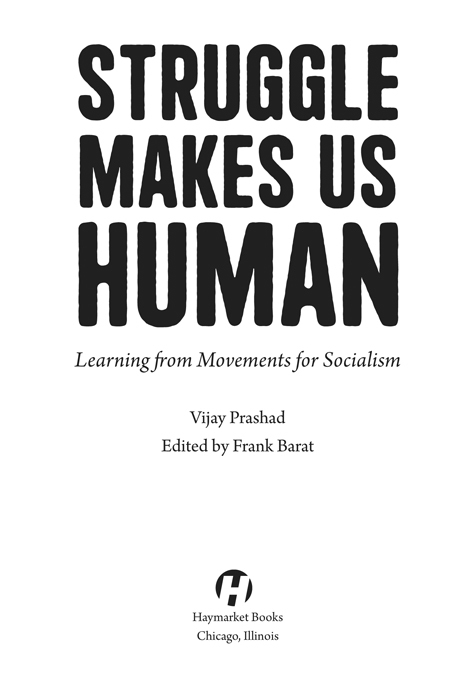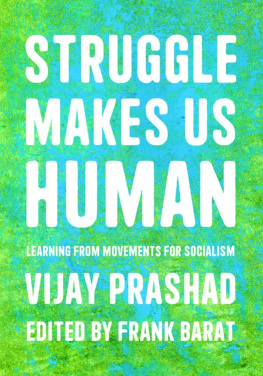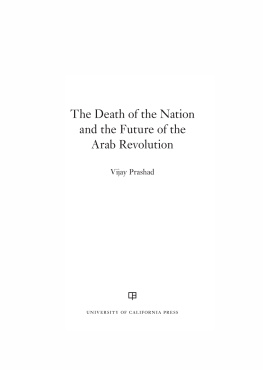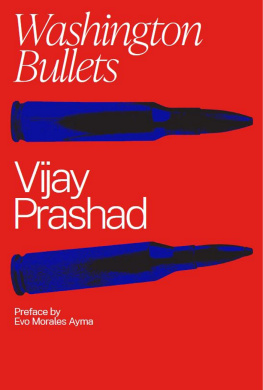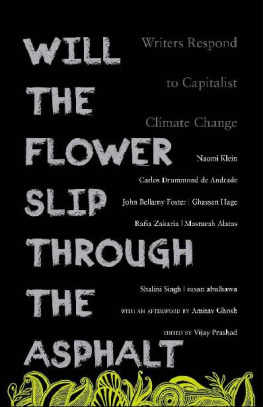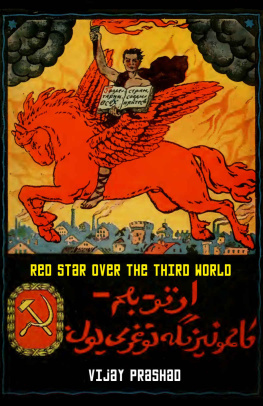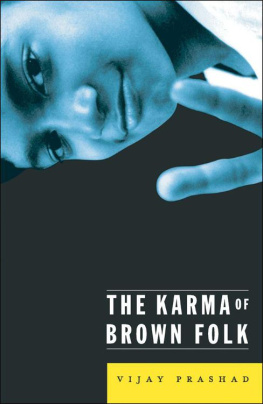PRAISE FOR STRUGGLE MAKES US HUMAN
Vijay Prashads remarkable work has for years been an incomparable source of information and understanding about the Global South, while also providing incisive analysis of major developments of world affairs. Noam Chomsky
An essential, brilliant, revolutionary, post-pandemic conversation and primer about everything that matters and how we can move from the devastation of capitalism to a living, breathing, working socialism. Informative and profoundly inspirational. V (formerly Eve Ensler)
Struggle Makes Us Human is an impassioned and studied case for socialism. In the face of the collapse of the Soviet Union, the unrealized promise of the New International Economic Order, and the rupture between intellectual and grounded struggle, socialism remains as necessary and possible as ever. Vijay Prashad takes readers on an intimate journey across the world and through history to introduce us to thinkers, workers, revolutionaries, and martyrs whose example offers glimpses of a horizon that remains within our reach. Noura Erakat
PRAISE FOR VIJAY PRASHAD
Vijay Prashad is our own Frantz Fanon. His writing of protest is always tinged with the beauty of hope. Amitava Kumar
Vijay Prashad recalls a past without which it is impossible to understand the present. Tariq Ali
Like his hero Eduardo Galeano, Vijay Prashad makes the telling of the truth lovable; not an easy trick to pull off. He does it effortlessly. Roger Waters
2022 Vijay Prashad and Frank Barat
Published in 2022 by
Haymarket Books
P.O. Box 180165
Chicago, IL 60618 773-583-7884
www.haymarketbooks.org
ISBN: 978-1-64259-717-2
Distributed to the trade in the US through Consortium Book Sales and Distribution (www.cbsd.com) and internationally through Ingram Publisher Services International (www.ingramcontent.com).
This book was published with the generous support of Lannan Foundation and Wallace Action Fund.
Special discounts are available for bulk purchases by organizations and institutions. Please email for more information.
Cover design by Rachel Cohen.
Library of Congress Cataloging-in-Publication data is available.
CONTENTS
For Jodie and Roy
On March 31, 2020, Frank Barat wrote to ask if I would spend fifteen minutes with him, via Skype, to talk about the pandemic. We met a few days later and talked about the developing crisis: the health impact on the populations of the world, the socioeconomic impact of the unfolding unemployment boom, and the cultural impact of the bewilderment occasioned by the antiscience rhetoric and the lockdowns and restrictions. Our conversation was wide ranging and fluid. It felt clear, even by April 2020, that the pandemic had opened wounds that had festered during the normal period that preceded it. We were not merely talking about what COV1D-19 was doing to the societies of the world, we were talking about what capitalism had done and what COV1D-19 had revealed. So, we decided to spend three days going deeper into the crisis. These three conversations allowed us to go beneath the surface of the conjuncture, to understand the festering wounds in terms of their history, and to grasp at the possibilities of moving political agendas out of the capitalist catastrophe and towards a possible socialism. Those conversations provide the basis for this book.
PART ONE
The System as It Is
ZIGS AND ZAGS BUT MOSTLY ZAGS
F RANK B ARAT: TINA, or There Is No Alternative, was a slogan used in the 80s around the Thatcher years in the UK. The problem is that 1 feel most people today still feel this way. Stillfeel like capitalism has won and that we cannot do much about it, that the years of revolutions are a thing of the past. What would you say to these people?
V IJAY P RASHAD: If we look back at the past forty years, there have been some important advances. We have seen, for instance, the attempts by people to come out onto the streets and overthrow governments that they found disagreeable. Fine, in Egypt, the uprising of 2011 ended up in a disaster, but it still happened. The people took to the streets in Cairo and some other cities and towns. Hosni Mubarak and his sons had to leave office. General Sisi continued the Mubarak legacy to a great extent. It was a zig and a zag. On the one side, the zig, there was something fundamentalpeople no longer wanted to live under an atrocious government and so they overthrew it. On the other side, the zag, the military returns, even if it takes off its uniform. But this does not mean that we wont see a zig coming up in the future. It is the fear of the zig that makes Sisi throw any opponent into prison.
In Tunisia, on the other hand, the uprising overthrew a very neo-liberal and ghastly kleptocracy led by Zine El Abidine Ben Ali. When Ben Ali fled in January 2011, a set of important social forcesincluding the trade unions, the left parties, the human rights groupsheld together the new Tunisian democracy. This is why these groups won the Nobel Prize for Peace in 2015, although this was two years afterand heres another zagthe poet and left political leader Chokri Belad was assassinated. The struggles in Tunisia since then have been difficult, including a slide into undemocratic rule, but there have been some advances in terms of popular confidence.
In 2009 two years before the uprisings in North Africa, we saw a popular upsurge elect the Democratic Partys Yukio Hatoyama prime minister of Japan. He came with a mandate to remove the US military base in Okinawa. Hatoyama moved toward removing the base, which is very unpopular in Okinawa itself but also in other parts of Japan. Thats the zig. But then came the zag. US president Barack Obama and his secretary of state Hillary Clinton put a lot of pressure on the Japanese political class, breaking Hatoyamas government and stopping the anti-base project in its tracks. Hatoyama had to resign in June 2010. The US base remains in Okinawa; in fact, it is being expanded at great cost, including environmental devastation of Henoko Bay (and the disappearance of the dugongs, the manatees). So thats the defeat, although there was the election on a mandate for peace.
Before the coup in Japan, in 2009, the US oversaw a coup in Honduras against the government of Manuel Zelaya. This coup came after a long period of US pressure on Latin American countries that had joined the Bolivarian project directed by the government in Venezuela. That Hugo Chavez was able to win an election in 1998 and then win a series of elections to establish a new constitution and to create a new regional dynamic, and fend off a coup in 2002, is remarkable. Venezuelas left turn in 1998 provided Cuba with an ally in Latin America, and then came a series of election victories in Brazil (with Lula in 2003) and Bolivia (with Evo Morales in 2006). Despite all the pressure on Venezuela and Cuba, they remain intact, and despite the coup in Bolivia, in November 2019 the people voted the socialists back into power and voted out the coup regime in Honduras in November 2021. With the coronavirus running rampant across Brazil, it is Cuba and Venezuela, two countries under immense sanctions and hybrid war, that have been able to contain the virus. We cannot only focus on defeats. We need to look at the zigs and the zags, and the jumps. Even if the zig is modest.
I dont blame people for the arrival of this defeatist attitude, namely that there is no alternative. Theres an enormous industry that produced this, a huge ideological push that provoked it. In 1944, Friedrich Hayek, who is seen as the guru of the neoliberal doctrine, published a book called The Road to Serfdom. Hayek basically argues that any time you want to make the world a better place, you are going to create a gulag. Dont try to do anything, let the invisible forces make justice come into the world, let the invisible hand create justice. The moment you try to put your hand into history, you will end up executing people. Thats the ultra-libertarian argument. This argument has become widespread in different ways. There are those who totally attack anyone who tries to socially engineer the good, disparaging the state as an institution for social change. Anti-state politics of the right and the left meet on this terrain. There is affinity here for a kind of liberal politics that is popular among a range of people that retains great faith in the structures of formal democracy, and that believes there is no need to be acting outside these formations since the democratic system will take care of things. This kind of liberalism, which has tremendous faith in the system, demobilizes public action. If there is to be a public action, let it be along the grain of lawfulness, with no challenge to the system. In fact, the ultra-libertarians, the left anti-state people, the liberal democratsall of them promote, in different ways, the demobilization of public action. Over a generation or two generations, basic faith in formal democracy has been reinforced across the political spectrum in the advanced democratic countries.
